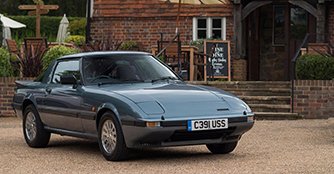Celebrating 40 years of the Mazda RX-7
20 Jun 2018|2,578 views
In the 1970s carmakers the world over found themselves faced with the grim reality of a global fuel crisis. Soaring petrol prices meant few drivers wanted to own big, gas-guzzling V8 sports cars, so a new approach was needed. Responding to the challenging environment, Mazda's brightest brains set about creating a new kind of sports car - one that would be smaller, lighter, more efficient and - most important of all - fun to drive.

The original RX-7 FB proved a huge success. More than 470,000 driving enthusiasts bought one, before the second generation FC model was introduced with turbo power in 1985.
The third generation FD followed in 1992 until production of the iconic RX-7 ended in 2002.
In addition, the RX-7's success in competition around the globe further cemented its position as a one of the world's best sports cars. The RX-7 took overall victory in the 1981 Spa 24 hours, competed at Le Mans, took part in the awe-inspiring world of Group B rallying and claimed the 1980 and 1981 BTCC titles. In the U.S.A, the RX-7 took an unmatched 100 wins in 12 years of IMSA competition and won the GTU class at the 1979 Daytona 24 hours.
To mark the 40th anniversary of the Mazda RX-7, Mazda brought together all three generations of the sports car in a film that documents the evolution of the most successful model to be powered by a rotary engine.
In the 1970s carmakers the world over found themselves faced with the grim reality of a global fuel crisis. Soaring petrol prices meant few drivers wanted to own big, gas-guzzling V8 sports cars, so a new approach was needed. Responding to the challenging environment, Mazda's brightest brains set about creating a new kind of sports car - one that would be smaller, lighter, more efficient and - most important of all - fun to drive.

More than 470,000 driving enthusiasts bought the original RX-7 FB before the second generation FC model was introduced in 1985
The original RX-7 FB proved a huge success. More than 470,000 driving enthusiasts bought one, before the second generation FC model was introduced with turbo power in 1985.
The third generation FD followed in 1992 until production of the iconic RX-7 ended in 2002.
In addition, the RX-7's success in competition around the globe further cemented its position as a one of the world's best sports cars. The RX-7 took overall victory in the 1981 Spa 24 hours, competed at Le Mans, took part in the awe-inspiring world of Group B rallying and claimed the 1980 and 1981 BTCC titles. In the U.S.A, the RX-7 took an unmatched 100 wins in 12 years of IMSA competition and won the GTU class at the 1979 Daytona 24 hours.
To mark the 40th anniversary of the Mazda RX-7, Mazda brought together all three generations of the sports car in a film that documents the evolution of the most successful model to be powered by a rotary engine.
Latest COE Prices
December 2025 | 2nd BIDDING
NEXT TENDER: 07 Jan 2026
CAT A$109,501
CAT B$115,102
CAT C$77,003
CAT E$119,000
View Full Results Thank You For Your Subscription.























